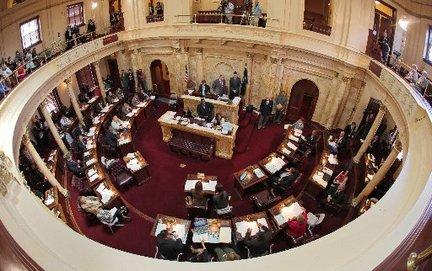By Matt Friedman
Nj.com
December 8, 2010
http://www.nj.com/news/index.ssf/2010/12/nj_senate_to_consider_expand_r.html
 |
| Overall view from the gallery as the senate begins their session at the Statehouse this afternoon. |
TRENTON — When a 26-year-old man known as "R.L." sued his former stepfather for allegedly sexually abusing him when he was 10 years old, he had to fight all the way to the state Supreme Court just to get the case heard.
New Jersey has a two-year statute of limitations on lawsuits for sexual abuse, which means victims have only two years to sue after they realize they were damaged by abuse.
"It was far more arduous than it should have been," said Victor Rotolo, an attorney who represented "R.L.," whose identity remains protected.
On Thursday, the Senate Judiciary Committee will consider a bill that would eliminate any statute of limitations on when sex abuse victims can sue — and allow them to take action against clergy, educators and others who knew about abuse and did nothing to stop it.
Under current law, victims can sue their abuser, or a parent or guardian who knew about the abuse and allowed it to occur. The bill would also allow victims to sue those who had "supervisory or disciplinary power" over them who did nothing about the abuse.
"The current process presents real obstacles for the victim that are unfair," said state Sen. Joseph Vitale (D-Middlesex), a sponsor. "For those who discover their abuse later on in life, this will give them a greater opportunity to bring a civil action against an individual and the institutions that harbor the criminals."
Advocates for sexual abuse victims said they often take years to gather the courage to come forward with their stories, and often suffer post-traumatic stress disorder and depression.
"It's allowing survivors to have their day in court," said Mark Crawford, who was molested by a priest as a teen and now runs the New Jersey chapter of the Survivors Network for those Abused by Priests.
Patrick R. Brannigan, executive director of the New Jersey Catholic Conference, plans to testify against the bill.
"Statutes of limitations exist for a reason. It's not only in such heinous actions as sex abuse, but in all civil actions. As time goes on, memories fade, people die, records are lost," Brannigan said. "From a legal perspective, the statutes exist to assure that there is fairness in the judicial process and that there are speedy trials. This bill will not protect a single child. This is backward-looking, not forward-looking."
The bill (S2405) was introduced three weeks before The Star-Ledger published a report that concluded Newark Archbishop John J. Myers shielded at least four priests accused of sexual abuse.
"It's not necessarily specifically targeting the church," said Senate Judiciary Committee chairman Nicholas Scutari (D-Union), who is also a sponsor. "Although I think the church was in the forefront of this in recent events."
Gov. Chris Christie had a pre-arranged meeting today with bishops from the state's seven Roman Catholic dioceses, according to Christie spokesman Michael Drewniak. He would not provide details about the meeting, including whether the bill was discussed.
Drewniak did not say whether or not Christie would sign the bill if it passes both houses of the Legislature. "Like all legislation, we will take a very close look at it to make sure it is constitutional and all legal issues are addressed," he said.
Statutes of limitations on sexual abuse vary widely state by state, and there have been movements across the country to change or eliminate them. In New York, victims of sexual abuse have five years after they turn 18 to file suit; in Pennsylvania, they have 12 years. Alaska, Maine and Delaware have no limits.
A measure to allow some exemptions to Connecticut's 30-year statute of limitations was met with fierce resistance from the state's Catholic bishops and has failed twice in that state's Legislature.
Any original material on these pages is copyright © BishopAccountability.org 2004. Reproduce freely with attribution.